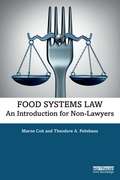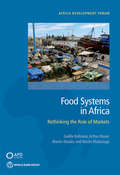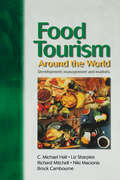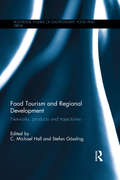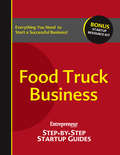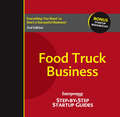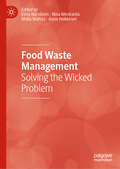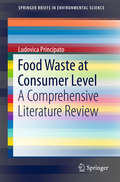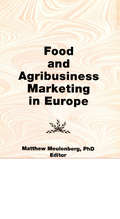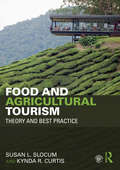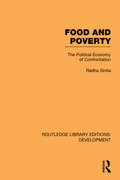- Table View
- List View
Food Systems Law: An Introduction for Non-Lawyers
by Theodore A. Feitshans Marne CoitFood law is a rapidly developing area, with interest being driven at the consumer, handler and farm level. This introductory textbook provides an overview of the concepts necessary for an understanding of food law and regulations, providing the non-specialist reader with a more comprehensive understanding of food systems from production to consumption. Food Systems Law first introduces the US legal system and then moves on to explain the Federal Regulation of Food systems, the Food Safety Modernization Act (FSMA) and the Farm Bill, the single most important piece of legislation which impacts the way in which federal resources are used within the food industry. The following chapters provide concise explanations of key topics including food safety, food labeling, organic certification and food waste, with examples from US law and policy included. Importantly, the book also addresses key topics which overlap with food law, such as environmental, health and agricultural law. This textbook is geared towards a non-legal audience, particularly students of interdisciplinary food studies and food science who are taking food law courses, as well as those studying agricultural law, food policy and environmental law. It will also be of interest to professionals working in the food industry and those who want to learn more about how food is regulated.
Food Systems in Africa: Rethinking the Role of Markets (Africa Development Forum)
by Gaëlle Balineau Arthur Bauer Martin Kessler MadariagaRapid population growth, poorly planned urbanization, and evolving agricultural production and distribution practices are changing foodways in African cities and creating challenges: Africans are increasingly facing hunger, undernutrition, and malnutrition. Yet change also creates new opportunities. The food economy currently is the main source of jobs on the continent, promising more employment in the near future in farming, food processing, and food product distribution. These opportunities are undermined, however, by inefficient links among farmers, intermediaries, and consumers, leading to the loss of one-third of all food produced. This volume is an in-depth analysis of food system shortcomings in three West African cities: Abidjan, Côte d’Ivoire; Rabat, Morocco; and Niamey, Niger. Using the lens of geographical economics and sociology, the authors draw on quantitative and qualitative field surveys and case studies to offer insightful analyses of political institutions. They show the importance of “hard†? physical infrastructure, such as transport, storage, and wholesale and retail market facilities. They also describe the “soft†? infrastructure of institutions that facilitate trade, such as interpersonal trust, market information systems, and business climates. The authors find that the vague mandates and limited capacities of national trade and agriculture ministries, regional and urban authorities, neighborhood councils, and market cooperatives often hamper policy interventions. This volume comes to a simple conclusion: international development policy makers and their financial and technical partners have neglected urban markets for far too long, and now is the time to rethink and reinvest in this complex yet crucial subject.
Food Tourism
by John Stanley Linda StanleyThe fastest growth in tourism is the culinary sector. Covering farmers markets, taste tours, agri-entertainment, glamping, restaurants, farm shops and more, food tourism has become both an important part of holidaying and a purpose in itself. With growth occurring in most developed countries and tourists searching out culinary tourism throughout the world, this book provides an overall direction to the development of food tourism and a section on the future of this trend.
Food Tourism Around The World
by C. Michael Hall Liz Sharples Richard Mitchell Niki Macionis Brock CambourneFood and wine are vital components of the tourism experience, and are increasingly being seen as prime travel motivators in their own right. Food Tourism Around The World: Development, Management and Markets offers a unique insight into this phenomenon, looking at the interrelationship between food, the tourism product and the tourist experience.Using international case studies and examples from Europe, North America, Australasia and Singapore, Food Tourism Around The World: Development, Management and Markets discusses the development, range and repurcussions of the food tourism phenomenon. The multi-national contributor team analyses such issues as:* the food tourism product* food tourism and consumer behaviour* cookery schools - educational vacations* food as an attraction in destination marketingIdeal for both students and practioners, the book represents the most comprehensive and wide-ranging treatment yet of this recent development in tourism.
Food Tourism and Regional Development: Networks, products and trajectories (Routledge Studies of Gastronomy, Food and Drink)
by Stefan Gössling C. HallFood tourism is a topic of increasing importance for many destinations. Seen as a means to potentially attract tourists and differentiate destinations and attractions by means of the association with particular products and cuisines, food is also regarded as an opportunity to generate added value from tourism through local agricultural systems and supply chains and the local food system. From a regional development perspective this book goes beyond culinary tourism to also look at some of the ways in which the interrelationships between food and tourism contribute to the economic, environmental and social wellbeing of destinations, communities and producers. It examines the way in which tourism and food can mutually add value for each other from the fork to the plate and beyond. Looking at products, e.g. cheese, craft beer, noodles, wine; attractions, restaurants and events; and diverse regional examples, e.g. Champagne, Hong Kong, Jamaica, Margaret River, southern Sweden, and Tuscany; the title highlights how clustering, networking and the cultural economy of food and tourism and foodscapes adds value for regions. Despite the attention given to food, wine and culinary tourism no book has previously directly focused on the contribution of food and tourism in regional development. This international collection has contributors and examples from almost every continent and provides a comprehensive account of the various intersections between food tourism and regional development. This timely and significant volume will inform future food and tourism development as well as regional development more widely and will be valuable reading for a range of disciplines including tourism, development studies, food and culinary studies, regional studies, geography and environmental studies.
Food Tourism: A Practical Marketing Guide
by John Stanley Linda StanleyThe fastest growth in tourism is the culinary sector. Covering farmers markets, taste tours, agri-entertainment, glamping, restaurants, farm shops and more, food tourism has become both an important part of holidaying and a purpose in itself. With growth occurring in most developed countries and tourists searching out culinary tourism throughout the world, this book provides an overall direction to the development of food tourism and a section on the future of this trend.
Food Truck Business
by Entrepreneur MagazineSatisfy Your Hunger for SuccessAt over a billion dollars, the food industry is evolving, creating new trends and new opportunities for eager entrepreneurs like you. Learn how you can become a part of one of the hottest and most affordable food businesses-mobile food.From gourmet food to all-American basics and hot dog wagons to bustaurants, get the delicious details behind starting a food truck business. Led by our experts, learn how to find your food niche, follow important rules of conducting business on the road, outfit your moving kitchen, meet safety and sanitation requirements, and much more. Plus, access recipes, shopping lists, favorite equipment buys and more from practicing food truck entrepreneurs.Six trendy mobile food opportunities: cart and concession trailers, kiosks, standard and gourmet trucks, mobile catering and bustaurantsHow to identify your customers and service nicheCreating your mobile menuChoosing and outfitting your vehicle or kioskLicenses, zoning, parking, and other considerationsScouting and staging for conducting businessHiring helpSetting pricesSpreading the wordAnd moreFrom choosing a business vehicle to franchising and everything in between, learn everything you need to know to get your business moving toward success!
Food Truck Business
by The Staff of Entrepreneur MediaThe experts at Entrepreneur provide a two-part guide to success. First, learn all the delicious detail behind starting one the hottest and most affordable food business: your own food truck. Then, master the fundamentals of business startup including defining your business structure, funding, staffing and more.This kit includes: Essential industry-specific startup essentials including industry trends, best practices, important resources, possible pitfalls, marketing musts, and more Entrepreneur Editors' Start Your Own Business, a guide to starting any business and surviving the first three years Interviews and advice from successful entrepreneurs in the industry Worksheets, brainstorming sections, and checklists Entrepreneur's Startup Resource Kit (downloadable)More about Entrepreneur's Startup Resource KitEvery small business is unique. Therefore, it's essential to have tools that are customizable depending on your business's needs. That's why with Entrepreneur is also offering you access to our Startup Resource Kit. Get instant access to thousands of business letters, sales letters, sample documents and more - all at your fingertips!You'll find the following:The Small Business Legal ToolkitWhen your business dreams go from idea to reality, you're suddenly faced with laws and regulations governing nearly every move you make. Learn how to stay in compliance and protect your business from legal action. In this essential toolkit, you'll get answers to the "how do I get started?" questions every business owner faces along with a thorough understanding of the legal and tax requirements of your business.Sample Business Letters1000+ customizable business letters covering each type of written business communication you're likelyto encounter as you communicate with customers, suppliers, employees, and others. Plus a complete guide to business communication that covers every question you may have about developing your own business communication style.Sample Sales LettersThe experts at Entrepreneur have compiled more than 1000 of the most effective sales letters covering introductions, prospecting, setting up appointments, cover letters, proposal letters, the all-important follow-up letter and letters covering all aspects of sales operations to help you make the sale, generate new customers and huge profits.
Food Wars: The Global Battle for Mouths, Minds and Markets
by Tim Lang Michael HeasmanIn the years since publication of the first edition of Food Wars much has happened in the world of food policy. This new edition brings these developments fully up to date within the original analytical framework of competing paradigms or worldviews shaping the direction and decision-making within food politics and policy. The key theme of the importance of integrating human and environmental health has become even more pressing. In the first edition the authors set out and brought together the different strands of emerging agendas and competing narratives. The second edition retains the same core structure and includes updated examples, case studies and the new issues which show how these conflicting tendencies have played out in practice over recent years and what this tells us about the way the global food system is heading. Examples of key issues given increased attention include: nutrition, including the global rise in obesity, as well as chronic conditions, hunger and under-nutrition the environment, particularly the challenges of climate change, biodiversity loss, water stress and food security food industry concentration and market power volatility and uncertainty over food prices and policy responses tensions over food, democracy and citizenship social and cultural aspects impacting food and nutrition policies.
Food Waste Management: Solving the Wicked Problem
by Elina Närvänen Nina Mesiranta Malla Mattila Anna HeikkinenThis book focuses on the crucial sustainability challenge of reducing food waste at the level of consumer-society. Providing an in-depth, research-based overview of the multifaceted problem, it considers environmental, economic, social and ethical factors. Perspectives included in the book address households, consumers, and organizations, and their role in reducing food waste. Rather than focusing upon the reasons for food waste itself, the chapters develop research-based solutions for the problem, providing a much-needed solution-orientated approach that takes multiple perspectives into account.Chapters 1, 2, 12 and 16 of this book are available open access under a CC BY 4.0 license at link.springer.com
Food Waste at Consumer Level: A Comprehensive Literature Review (SpringerBriefs in Environmental Science)
by Ludovica PrincipatoThis book presents what is the state-of-the-art in the field of the food waste phenomenon at consumer level, including a thorough literature review, and it highlights trends in the field. It provides a comprehensive starting point for future research. Food waste represents a major public policy issue, which is included in the UN Sustainable Development Goals. In this context, the present work identifies the most important definitions given to food waste and its environmental, social and economic impacts. With a comprehensive literature review that covers a forty-year time span (1977-2017), this book highlights the multiple, complex facets of food waste at the consumer level. Drawing from behavioural and marketing theories, it proposes a new theoretical framework with the aim to better explain food waste behaviour. Extensive research is being carried out on the main worldwide initiatives (both public and private) and food policies aimed at tackling the phenomenon.
Food and Agribusiness Marketing in Europe
by Erdener Kaynak Matthew MeulenbergThis groundbreaking book is the first to provide state-of-the-art information on the current changes and developments in European food and agricultural marketing. Food and Agribusiness Marketing in Europe contains broad and up-to-date coverage of agricultural and food marketing by experts in a variety of European countries including Germany, Greece, Italy, the United Kingdom, France, Ireland, Belgium, the Netherlands, Spain, and Hungary. With chapters selected by the famous marketing specialist Matthew Meulenberg of The Netherlands, this enlightening book allows food and marketing professionals to gain new perspectives on the changing roles of food retailing and food industry in agricultural marketing and the structure of agriculture and food markets.This insightful book introduces readers to the common factors influencing European food marketing today including the stagnating volume of food demand, severe competition between suppliers of agricultural and food products, the overall shift in agricultural marketing towards more market-consumer orientation, and the resulting concern about product development, branding, and customer relationships. Major national differences in food and agricultural marketing in each country are also analyzed, in particular, the problems of implementing European Community legislation in the face of tremendous divergences among member countries in their needs, expectations, and priorities. Some of the other important topics covered in this in-depth book include:European food consumption and consumersfood retailing in Europethe impact of the Common Agricultural policy and other government policies on agricultural marketingthe conduct of agricultural marketing institutions and agribusinesses and their marketing performancesagricultural and food marketing channels in European countries Food and Agribusiness Marketing in Europe is the first resource available that provides essential information on the tremendous changes in food and agricultural marketing in Europe. It is an invaluable reference on European marketing for students and teachers of agricultural marketing, European-oriented agribusiness managers, and internationally oriented agriculture policymakers who need to develop an understanding of food marketing developments in this area of the world.
Food and Agricultural Tourism: Theory and Best Practice
by Susan L. Slocum Kynda R. CurtisThis book fills a gap in the growing academic discipline of food and agricultural tourism, offering the first multidisciplinary approach to food tourism and the role it plays in economic development, destination marketing, and gastronomic exploration. It provides a comprehensive introduction to the discipline by considering food tourism in connection with both cultural values and important issues in agriculture, food consumption and safety, and rural heritage and sustainability. The book is divided into four Parts. Part I defines the elements of food tourism and explains its relationship with sustainability. Part II provides an overview of rural development and demonstrates the impact of industrialization and globalization on eating habits. Part III focuses on food tourism studies and market segmentation techniques to help students understand customer needs regarding food tourism products. Finally, Part IV looks at the financial, policy, and legal requirements relating to food tourism development, providing hands-on tools for students entering food tourism businesses or industries. Complemented by a wide range of international case studies, key definitions, and study questions, Food and Agricultural Tourism is essential reading for students of tourism, geography, and economic development studies.
Food and Beverage Management
by Ioannis Pantelidis Peter Alcott Bernard Davis Andrew LockwoodThis introductory textbook provides a thorough guide to the management of food and beverage outlets, from their day-to-day running through to the wider concerns of the hospitality industry. It explores the broad range of subject areas that encompass the food and beverage market and its five main sectors - fast food and popular catering, hotels and quality restaurants and functional, industrial, and welfare catering. New to this edition are case studies covering the latest industry developments, and coverage of contemporary environmental concerns, such as sourcing, sustainability and responsible farming. It is illustrated in full colour and contains end-of-chapter summaries and revision questions to test your knowledge as you progress. Written by authors with many years of industry practice and teaching experience, this book is the ideal guide to the subject for hospitality students and industry practitioners alike.
Food and Beverage Management: A Selection Of Readings (Management Reader Ser.)
by Peter Alcott Bernard Davis Andrew Lockwood Ioannis S. PantelidisThis introductory textbook provides a thorough guide to the management of food and beverage outlets, from their day-to-day running through to the wider concerns of the hospitality industry. It explores the broad range of subject areas that encompass the food and beverage market and its main sectors – fast food and casual dining, hotels and quality restaurants and event, industrial and welfare catering. It also looks at some of the important trends affecting the food and beverage industry, covering consumers, the environment and ethical concerns as well as developments in technology. New to this edition: New chapter: Classifying food and drink service operations. New international case studies throughout covering the latest industry developments within a wide range of businesses. Enhanced coverage of financial aspects, including forecasting and menu pricing with respective examples of costings. New coverage of contemporary trends, including events management, use of technology, use of social media in marketing, customer management and environmental concerns, such as sourcing, sustainability and waste management. Updated companion website, including new case studies, PowerPoint slides, multiple choice questions, revision notes, true or false questions, short answer questions and new video and web links per chapter. It is illustrated in full colour and contains in-chapter activities as well as end-of-chapter summaries and revision questions to test the readers' knowledge as they progress. Written by a team of authors with many years of industry practice and teaching experience, this book is the ideal guide to the subject for hospitality students and industry practitioners alike.
Food and Cooking on Early Television in Europe: Impact on Postwar Foodways (Critical Food Studies)
by Ana TomincThis collection critically examines the role of food programming on European early television and the impact this might have had on food habits and identities for the European audiences. It foregrounds various food programme genres, from travelog, cooking show and TV cooking competition, to more artistic forms. For the first time, it examines in one place eight European countries, from Portugal to Czechoslovakia and Britain to France and Yugoslavia, to explore ways in which television contributed to culinary change, demonstrating differences and similarities in which early food programme in Europe shaped and promoted progress, modernity, gender and national identities in both Eastern and Western Europe. Featuring a number of archival images that illustrate early food programme visually, this collection complements other research into postwar food history, adding a perspective of visual medium that is often neglected. As such, it should be interesting for food and media historians as well as those interested in European postwar history and culture.
Food and Drink Tourism: Principles and Practice
by Sally EverettDedicated to the growing field of food and drink tourism and culinary engagement, Sally Everett offers a multi-disciplinary approach to the subject, embracing theories and examples from numerous subject disciplines. Through a combination of critical theory reflections, real-life case studies, media excerpts and activities, examples of food and drink tourism around the world as well as a focus on employability, Food and Drink Tourism provides a comprehensive & engaging resource on the growing trend of food motivated travel & leisure. Suitable for any student studying tourism, hospitality, events, sociology, marketing, business or cultural studies.
Food and Drink Tourism: Principles and Practice
by Sally EverettDedicated to the growing field of food and drink tourism and culinary engagement, Sally Everett offers a multi-disciplinary approach to the subject, embracing theories and examples from numerous subject disciplines. Through a combination of critical theory reflections, real-life case studies, media excerpts and activities, examples of food and drink tourism around the world as well as a focus on employability, Food and Drink Tourism provides a comprehensive & engaging resource on the growing trend of food motivated travel & leisure. Suitable for any student studying tourism, hospitality, events, sociology, marketing, business or cultural studies.
Food and Experiential Marketing: Pleasure, Wellbeing and Consumption (Routledge Interpretive Marketing Research)
by Wided BatatPleasure plays a significant but often neglected role in the creation of consumer wellbeing and the relationship between the food consumption experience and healthy eating. This innovative collection focusses on the experiential and hedonic aspects of food and the sociocultural, economic, ideological, and symbolic factors that influence how pleasure can contribute to consumer health, food education, and individual and societal wellbeing. Food and Experiential Marketing uses a holistic perspective to explore how the experiential side of food pleasure may drive healthy eating behaviors in varied food cultures. It questions: Is food pleasure an ally or an enemy of developing and adopting healthy eating habits? Can we design healthy offline and online food experiences that are pleasurable? What are the features of food consumption experiences, and how do they contribute to consumer wellbeing? Providing an overview of experiential and cultural issues in food marketing, this book will be invaluable for consumer behavior and food marketing scholars, public policy professionals, and the food industry in understanding the importance of pleasure in promoting healthy eating behaviors.
Food and Fuel: Solutions for the Future
by Evan Solomon Andrew HeintzmanThe twenty-first century has been dominated by two major global crises: a scarcity of food and fuel. Both have had detrimental effects on the environment and both are at the root of the fragile health of the global economy. Combining the best of the critically acclaimed Fuelling the Future and Feeding the Future, this timely and provocative collection of essays from leading thinkers such as Thomas Homer-Dixon, Gordon Laird, Jeremy Rifkin, Frances Moore Lappe, and Anna Lappe offers valuable strategies to combat global famine and fast-food fat; business models for sustainable food production and power sources; and descriptions of emerging technologies and sciences.
Food and Nutrition Security in the Kingdom of Saudi Arabia, Vol. 1: National Analysis of Agricultural and Food Security
by Jameel M. Al-Khayri Adam E. Ahmed Azharia A. ElbushraFood and nutrition security is a major concern for Saudi Arabia and the surrounding regions due to the range of challenges they face. These challenges include limited agricultural resources, low self-sufficiency in key food staples, climate change, and high levels of food loss and waste. This book aims to evaluate and analyze the current situation and future prospects of food and nutrition security in Saudi Arabia. Additionally, it seeks to analyze and assess the roles and functions of various institutions related to food security, providing a deeper understanding of the complex problems associated with it. Furthermore, this book aligns with Kingdom Vision 2030, which includes a set of strategies and programs focused on agriculture, food, and water security. It also aligns with the institutional identity of King Faisal University's "Food Security and Environmental Sustainability".The book consists of four volumes. Volume 1, entitled "National Analysis of Agriculture and Food Security" aims to assess the current state of food security in Saudi Arabia, covering key aspects such as agriculture and food resources, food systems, crops, livestock, poultry, fisheries, animal health, food loss and waste, transportation and strategic reserve infrastructure, food security institutions, population, agricultural extension, climate change, agricultural mechanization, smart agriculture, and the utilization of solar energy.This book is highly significant for professionals, researchers, policymakers, and entrepreneurs involved in food and nutrition security in Saudi Arabia, the Gulf Cooperation Council, and various national and international organizations. It offers a comprehensive analysis of the obstacles and possibilities in ensuring food and nutrition security, as well as presenting practical approaches to address these issues. Additionally, graduate students studying in fields related to food and nutrition security will benefit from this book.
Food and Nutrition Security in the Kingdom of Saudi Arabia, Vol. 2: Macroeconomic Policy and Its Implication on Food and Nutrition Security
by Jameel M. Al-Khayri Adam E. Ahmed Azharia A. ElbushraFood and nutrition security is a major concern for Saudi Arabia and the surrounding regions due to the range of challenges they face. These challenges include limited agricultural resources, low self-sufficiency in key food staples, climate change, and high levels of food loss and waste. This book aims to evaluate and analyze the current situation and future prospects of food and nutrition security in Saudi Arabia. Additionally, it seeks to analyze and assess the roles and functions of various institutions related to food security, providing a deeper understanding of the complex problems associated with it. Furthermore, this book aligns with Kingdom Vision 2030, which includes a set of strategies and programs focused on agriculture, food, and water security. It also aligns with the institutional identity of King Faisal University's "Food Security and Environmental Sustainability".The book consists of four volumes. Volume 2 is entitled "Macroeconomic Policy Implications on Food and Nutrition Security". It covers various areas, including food price, loss and waste, processing, finance, trade, investment, quality and safety, consumption patterns, climate change, early warning systems, nutrition institutions, oil revenue, and the significance of date palm and Hassawi rice, genetically modified food, and edible insects in ensuring food and nutritional security.This book is highly significant for professionals, researchers, policymakers, and entrepreneurs involved in food and nutrition security in Saudi Arabia, the Gulf Cooperation Council, and various national and international organizations. It offers a comprehensive analysis of the obstacles and possibilities in ensuring food and nutrition security, as well as presenting practical approaches to address these issues. Additionally, graduate students studying in fields related to food and nutrition security will benefit from this book.
Food and Poverty: The Political Economy of Confrontation (Routledge Library Editions: Development)
by Radha SinhaFirst published in 1976, this book deals with contemporary tensions between the West and the Third World, caused by hunger, malnutrition and poverty, perpetuated by an imbalance in the distribution of world resources. The book deals with the issue of malnutrition in the Third World, which owes much more to poverty and unemployment than to agricultural failure. The author also believes that population control can do little in the absence of a more equitable distribution of world resources and political power within and between countries involving a fundamental change in ideology and education. This is a challenging and critical book, whose arguments cannot be ignored by anyone concerned with the creation of a just and stable world order.
Food and Wine Events in Europe: A Stakeholder Approach (Routledge Advances in Event Research Series)
by Alessio Cavicchi Cristina SantiniFood and wine events have gained popularity internationally. Their importance in local economic development has grown, especially in Europe, as they are seen as a source of income for local economic systems, a way for creating new job positions and effective tools for promoting and increasing typical product awareness and demand. This book for the first time illustrates the positive and negative impacts of food and wine events from a stakeholder perspective by highlighting several critical aspects such as: (1) advantages and disadvantages of food and wine events; (2) best practice adoption for maximising benefits flowing from event creation; (3) community involvement and knowledge diffusion; (4) effectiveness in promoting local products and creating consumer awareness about products; (5) factors that promote or inhibit the success or achievements of wine and food events. Although the volume primarily focuses on events in Europe, comparisons are made to other regions in the world. Case studies are integrated throughout to illustrate the system of economic and social impacts linked to food and wine events, as well as best practices to achieve effective event management and maximize expected results. Written by leading academics, this timely and important volume will be valuable reading for all students, researchers and academics interested in Events, Tourism, Hospitality, Gastronomy and Development Studies.
Food and Wine Festivals and Events Around the World
by C. Michael Hall Liz SharplesFood and Wine Festivals and Events Around the World is a pioneering text that recognises the importance of this rapidly growing aspect of the tourism industry. Food and wine festivals and events play a significant role in rural and urban development and regeneration and the impacts of these events can be far ranging at a social, political, economic and environmental level. This innovative book recognises the development of food and wine festivals as a part of regional and national tourism strategies and uses international case studies to illustrate practice and contextualise theory. Bringing together an international contributor team of experts, this is the first book to study this profitable and expanding area of the tourism industry and provides a unique resource for those studying in the fields of tourism, event management and culinary arts.
